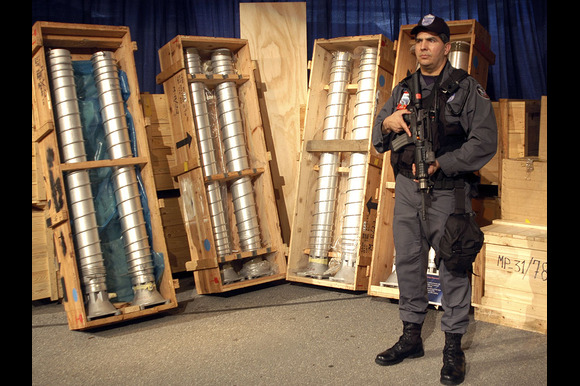Tbilisi, Georgia — Authorities in Georgia have detained three Chinese nationals accused of trying to illegally acquire 2kg of uranium in the capital, Tbilisi, officials announced on Friday.
Lasha Maghradze, deputy head of the State Security Service (SSG), said the group allegedly intended to pay $400,000 (£300,570) for the radioactive material and then smuggle it to China via Russia.
The alleged operation was uncovered by Georgian intelligence agents, who intercepted the suspects during what they described as an attempt to buy the uranium on the black market.
Intelligence Operation Foils Alleged Nuclear Deal
According to Maghradze, one member of the group was under surveillance when the SSG identified plans to purchase and move the material abroad. The operation, he said, was “part of a larger network coordinated by associates in China.”
SSG-released footage shows armed agents surrounding a vehicle and detaining three suspects. The video also depicts two glass jars filled with a yellow substance inside the car’s boot, later confirmed by tests to be uranium.
Officials have not yet specified which isotope of uranium was involved, though all forms of the element emit harmful radiation. Authorities are also investigating the suspects’ intended use for the nuclear material.
Court Proceedings and Charges
The three Chinese nationals have pleaded not guilty in a Tbilisi court, according to Georgia’s public broadcaster Georgia Today. They remain in pre-trial detention to prevent any attempt to flee the country.
Under Georgia’s criminal code, purchasing or attempting to purchase nuclear material carries a maximum sentence of five years in prison. Prosecutors say further arrests are possible as they trace connections to contacts abroad.
Longstanding Nuclear Security Concerns
Georgia, a former Soviet republic, inherited stockpiles of nuclear and radioactive materials after the Soviet Union’s collapse in 1991. Since then, the security of those materials has remained a national and international concern, with the country often cited as a key transit point for illicit nuclear trade.
Authorities have disrupted several black-market attempts in recent years. In July, the SSG arrested a Georgian and a Turkish citizen accused of trying to sell uranium worth an estimated $3 million.
The latest arrests, officials warn, highlight the continuing threat of nuclear smuggling networks operating across the region — and underscore the need for tight security cooperation between Georgia and its partners.






